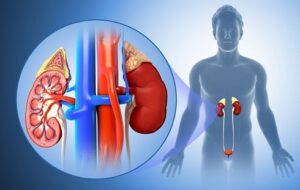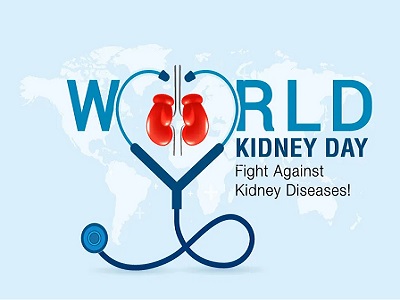World Kidney Day: Understanding the Importance of healthy kidney
World Kidney Day is a global occasion to raise awareness about the importance of maintaining the health of this key organ in the body. The importance of having healthy kidneys, reducing issues related to kidney health and encouraging awareness about new treatments are some of the approaches of informing on this day.
The kidneys are complicated and amazing organs that do many essential tasks to keep us healthy.
The main job of your kidneys is to remove toxins and excess water from your blood.
Kidneys also help to control your blood pressure, to produce red blood cells and to keep your bones healthy. Each roughly the size of your fist, kidneys are located deep in the abdomen, beneath the rib cage.

Your kidneys control blood stream levels of many minerals and molecules including sodium and potassium, and help to control blood acidity. Every day your kidneys carefully control the salt and water in your body so that your blood pressure remains the same.
What is Chronic Kidney Disease?
Chronic kidney disease (CKD) is a progressive loss in kidney function over a period of months or years. Each of your kidneys has about a million tiny filters, called nephrons. If nephrons are damaged, they stop working. For a while, healthy nephrons can take on the extra work. But if the damage continues, more and more nephrons shut down. After a certain point, the nephrons that are left cannot filter your blood well enough to keep you healthy.
When kidney function falls below a certain point, it is called kidney failure. Kidney failure affects your whole body, and can make you feel very ill. Untreated kidney failure can be life-threatening.
What you should not forget:
- Early chronic kidney disease has no signs or symptoms.
- Chronic kidney disease usually does not go away.
- Kidney disease can be treated. The earlier you know you have it, the better your chances of receiving effective treatment.
- Blood and urine tests are used to check for kidney disease.
- Kidney disease can progress to kidney failure.
What can you do for your kidneys?
Kidney diseases are silent killers, which can largely affect your quality of life. There are several ways to reduce the risk of developing kidney disease.
Keep fit, Be active
This can help to maintain an ideal body weight, reduce your blood pressure and the risk of Chronic Kidney Disease.
The concept On the move for kidney health is a worldwide collective march involving the public, celebrities and professionals moving across a public area by walking, running and cycling. Why not join them – by whatever means you prefer! Check out the events section of the WKD website for more information
Eat a healthy diet
This can help to maintain an ideal body weight, reduce your blood pressure, prevent diabetes, heart disease and other conditions associated with Chronic Kidney Disease.
Reduce your salt intake. The recommended sodium intake is 5-6 grams of salt per day. This includes the salt already in your foods. (around a teaspoon). To reduce your salt intake, try and limit the amount of processed and restaurant food and do not add salt to food. It will be easier to control your salt intake if you prepare the food yourself with fresh ingredients.
Check and control your blood sugar
About half of people who have diabetes do not know they have diabetes. Therefore, you need to check your blood sugar level as part of your general body checkup. This is especially important for those who are approaching middle age or older. About half of people who have diabetes develop kidney damage; but this can be prevented/ limited if the diabetes is well controlled. Check your kidney function regularly with blood and urine tests.

Five Tests for Kidney Disease
There are various methods and tests available to check your kidneys and monitor the progression of kidney disease. Your provider may choose one or multiple of the following to examine the health of your kidneys:
BLOOD TEST FOR GFR
This blood test checks how well your kidneys filter your blood by measuring your glomerular filtration rate (GMR). This test also considers how much creatine, a waste product removed by functioning kidneys, is left in the blood. When kidney disease worsens, a higher amount of creatine is found in the blood. The results of the blood test for GFR will help the healthcare provider form a diagnosis. GFR that is 60 or higher is normal, but a GFR that is less than 60 may indicate that you have kidney disease. When a GFR is 15 or less, this is considered kidney failure and will require immediate action such as dialysis or a kidney transplant.
URINE TEST FOR ALBUMIN
Another one of the commonly administered tests for kidney disease is a urine test that checks for albumin. Albumin is a protein found in the blood, and when the kidneys are healthy, they prohibit this protein from being passed to the urine. If the test reveals albumin in the urine, some steps need to be taken to try and preserve kidney function.
BLOOD UREA NITROGEN TEST (BUN)
Urea nitrogen is another waste product that may be consistent with kidney disease when high amounts of it are present in the blood. A blood urea nitrogen test measures how much urea nitrogen is in the blood. This test can be used in conjunction with a GFR blood test.
Serum Creatinine Test
Creatinine is a waste product generated by muscle metabolism and excreted by the kidneys. Elevated levels of serum creatinine in the blood may indicate impaired kidney function. Our serum creatinine test provides valuable insights into kidney health, helping detect dysfunction early on.
At Payvand Clinical and Specialty Laboratory, we stand committed to offering comprehensive Renal Function Testing services to our valuable customers. By prioritizing kidney health and delivering accessible, high-quality care, we empower individuals to lead healthier, more fulfilling lives.
Together, let’s prioritize kidney health and work towards a future where kidney diseases are detected early, managed effectively, and ultimately prevented. With PayvandLab by your side, you can take proactive steps towards optimal kidney health and a brighter, healthier future.


